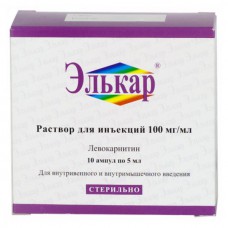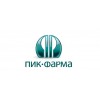Expiration date: 04/2028
Composition and form of issue:
Solution for injection, 1 ml contains active substance:
cornific (levocarnitine) 0 1 g
excipients: water for injection — up to 1 ml
in ampoules of colorless glass with a point or a ring of fracture of 5 ml in a pack with partitions of 10 ampoules or in a contour cell package of PVC film 5 ampoules in a pack of cardboard 2 packages or in a box of cardboard 10 or 20 packages (for the hospital).
Description of dosage form:
Transparent colorless liquid.
Pharmacokinetics:
After the on/in 3 hours almost completely removed from the blood. Easily penetrates the liver and myocardium, slowly — in the muscles. It is excreted by the kidneys mainly in the form of acyl esters (more than 80% for 24 hours).
Description of pharmacological action:
Elcar — a tool for the correction of metabolic processes.
L-carnitine (a natural substance related to b vitamins) participates in metabolic processes as a carrier of fatty acids through cell membranes from the cytoplasm to the mitochondria, where they are oxidized (beta-oxidation process) to form a large amount of metabolic energy (in the form of ATP). L-carnitine increases the resistance of nervous tissue to damaging factors (hypoxia, trauma, intoxication, etc.), inhibits the formation of keto acids and anaerobic glycolysis, reduces the degree of lactate acidosis. The drug replenishes the alkaline reserve of blood, helps to restore the autoregulation of cerebral hemodynamics and increase blood supply to the affected area, accelerates the reparative processes in the lesion and has an anabolic effect.
Indications:
- acute hypoxic conditions (acute brain hypoxia, ischemic stroke, transient ischemic attack) — as part of complex therapy
- acute, subacute and restorative periods of cerebral circulation disorders
- dyscirculatory encephalopathy and various traumatic and toxic brain lesions
- recovery period after surgery
- primary and secondary carnitine deficiency, including patients with chronic renal failure, hemodialysis
- cardiomyopathy
- IHD (angina, acute myocardial infarction, postinfarction conditions)
- hypoperfusion due to cardiogenic shock and other metabolic disorders in the myocardium.
Contraindications:
- individual intolerance
- pregnancy and lactation (currently there are no data on the possibility and safety of the drug during pregnancy and breastfeeding).
Side effect:
Possible allergic reactions, muscle weakness (in patients with uremia). With rapid administration (80 drops per minute or more), pain may occur along the vein, passing with a decrease in the rate of administration.
Drug interaction:
GCS contribute to the accumulation of the drug in the tissues (except the liver), other anabolics enhance the effect.
Dosage and administration:
In/in, drip slowly or jet (2-3 min) or / m. Before / in the introduction of the contents of the ampoule is dissolved in 100-200 ml of solvent (0, 9% sodium chloride solution or 5% dextrose solution (glucose).
In acute disorders of cerebral circulation — 1 g/day for 3 days, and then — 0, 5 g/day for 7 days. After 10-12 days, repeated courses for 3-5 days are possible.
When prescribing the drug in the subacute and recovery period, dyscirculatory encephalopathy and various brain lesions, carnitine deficiency, patients are administered a solution of Elcar at the rate of 0, 5-1 g/day in/in (drip, jet) or / m (2-3 times a day) without dilution for 3-7 days. If necessary, after 12-14 days, appoint a second course.
In/in the introduction, slowly (2-3 min), is prescribed for secondary carnitine deficiency in hemodialysis — 2 g once (after the procedure) with acute myocardial infarction, acute heart failure — 3-5 g/day, divided into 2-3 doses in the first 2-3-and day, followed by a reduction in dose 2 times with cardiogenic shock — 3-5 g/day, divided into 2-3 admission to the patient from shock. Next, go to the oral administration of the drug Elcar.


